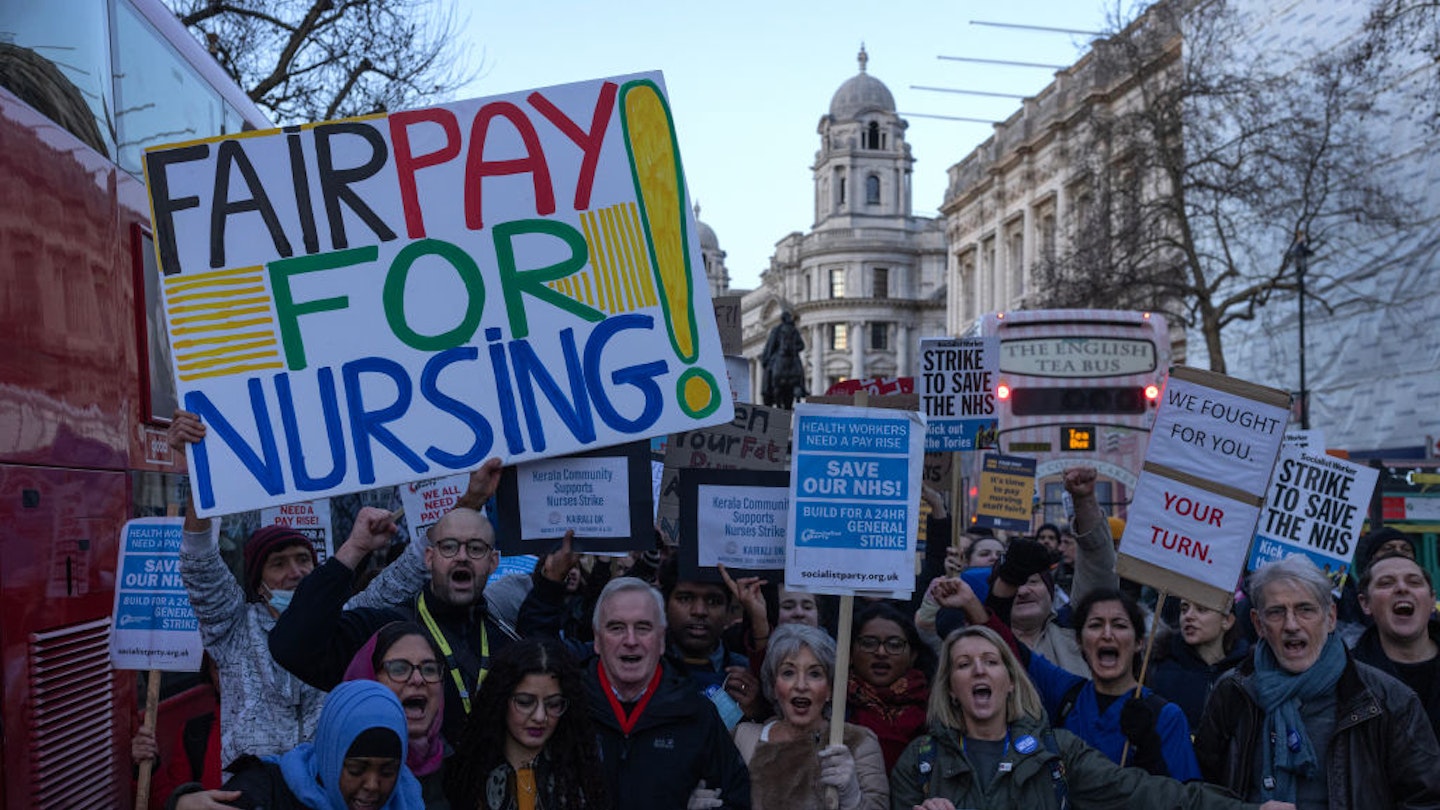A doctor has gone viral on Twitter for perfectly explaining the ongoing NHS crisis as nursing strikes enter their 4th week and ambulance workers are expected to join suit this week. In a passionate series of tweets liked by more than 50,000 people, consultant physician Dr Peter Neville told of how in his 32 years of service, this is the worst he’s seen the NHS. It comes one day after prime minister Rishi Sunak refused to answer questions about whether or not he uses the NHS or sees a private GP himself, a telling silence.
The NHS was at its best, Dr Neville says, in 2008 – explaining that over the past 15 years the service has crumbled for various reasons. If you’re struggling to get to grips with how the British health service landed here, Dr Neville’s thread will help.
‘Over at least the past 15 years, we have seen a relentless increase in demand, both in primary care and in hospital care,’ he begins. ‘This has been absolutely predictable by social statisticians for decades and is based on the fact that our elderly is surviving much longer. Our elderly uses a very large percentage of NHS of resources, unsurprisingly because they are more prone to disease, frailty, and dementia. They need more social care and hospital care as they get older. And they are living longer. (Immigrants, by the way, use much less care).’
Over this period, Dr Neville says, NHS funding has generally risen by around 1-2% over inflation. But demand for the service has increased considerably above 2%, meaning spend per person has fallen.
‘The NHS is not responsible for social or community care,’ he continues. ‘When elderly folk come into hospital they decondition very quickly and require physio and OT to get back on their feet. Often a care package is required, sometimes even a care home place. This is the responsibility of the local council to sort out. But council funding has been cut and social workers are dealing with huge caseloads. So, there are big delays. And we can't send the patients safely home until their care package is sorted out. So, they wait. And wait.’
Neville describes these patients sitting on hospital wards often bored and frustrated. ‘About 33% of hospital beds are filled with “fit for discharge” patients,’ he reveals. ‘UK hospitals can do nothing about this. We are effectively working on 66% capacity. Which is one of the key reasons why A&E is rammed.’
Then comes issues with the NHS pension, which affects staffing. ‘In 2015, the [NHS pension] was rearranged to save money, and ensure people have to work longer. It was not done well, and this has led to some facing bizarrely massive tax bills - 5 figure sums are common. If the pension is no longer an incentive to remain working for the NHS, then medical and nursing staff can leave the NHS and do agency work. It pays a much higher rate, and you can work as much or as little as you want. It gives you control back - very attractive for parents.’
That’s why so many are leaving the NHS for agency or locum work, Dr Neville says. ‘Once this happens, we have a tipping point. There are lots of vacancies in the NHS that have to be filled by agency nurses who cost much more to employ - there are agency fees as well. Those of us left are working in jobs with constant colleague absences. So, we must work harder, often covering extra shifts at short notice. Because we have to. There is moral pressure to cover on call gaps because the service cannot be allowed to collapse. We are all so tired.’
At the same time, the NHS cannot recruit consultants because there are simply not enough people to fill the posts.
‘The nurses are striking because they have to,’ Dr Neville concludes. ‘Not just because they personally are not paid enough, but because they need the vacant posts filling. They know that if they do not improve pay and working conditions very soon, morale will collapse, and we will face mass resignations and retirements. Because when you can earn more driving an HGV than running a ward, you know your profession is in trouble. They know that if the government wins this, nursing will collapse anyway.’
Having worked in the NHS all of his life, Dr Neville says he has never known it anywhere near as bad as now, and yet the government are trying to blame the nurses themselves.
‘Don't be fooled by the comments about cost,’ he finishes. ‘The NHS needs more. If it doesn't get it, YOU will end up paying it somehow. Either through a new state insurance scheme. Or private insurance. Remember the UK spends 9% of GDP on healthcare. The USA spends about 15%.’
